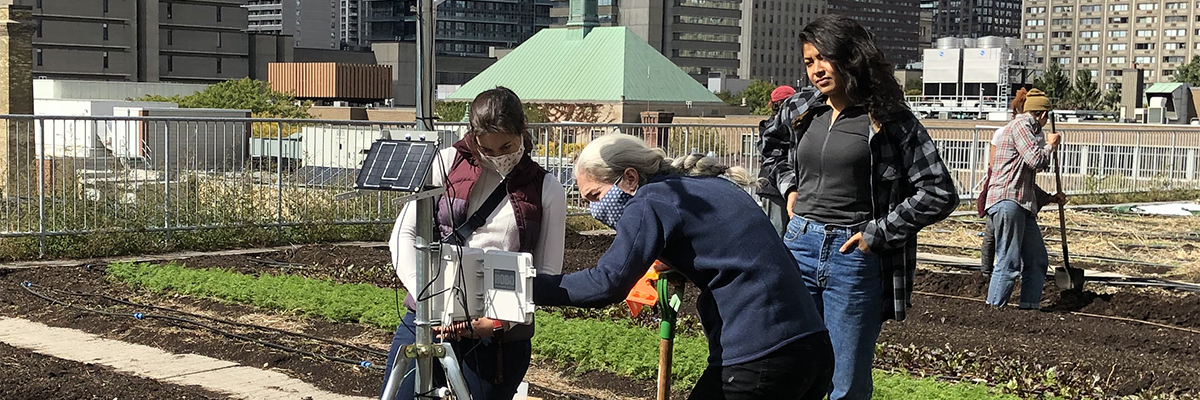Research Applications and Requests

Research priorities overview
The TMU Urban Farm Living Lab’s (TMUFLL) research priorities were established in 2020 through a series of community consultations. This was achieved through two rounds of surveys and a roundtable event hosted in February 2022. Students, faculty, and staff were engaged across TMU’s disciplines and departments, along with external stakeholders from a range of sectors relating to rooftop farming, including:
- farming organizations/projects (farmers, administrators, growers, etc.)
- industry professionals (architects, developers, green roof companies, etc.)
- member/volunteer organizations (non-profits, non-governmental organizations, etc.)
- patrons (customers, program participants, donors, investors, etc.)
- public sector (public health, government, university administrators, etc.)
- researchers/educators
Through this process, more than 200 stakeholders contributed feedback that was analyzed to derive user-driven research needs in rooftop farming.
Research priorities
In a continued effort to align with the Urban Farm’s mission to build capacity for rooftop farming through production, research and engagement, the Living Lab is seeking research partnerships and projects that respond directly to these established priorities:
- design and infrastructure
- quantifying ecosystem services
- financial sustainability
- Indigenous wisdom
- food justice
- soil health
- policy and incentives
- system integration
- operational models
Research project proposals
If you have a project proposal that responds to one or more of the research priorities outlined above, please complete the (google form) Living Lab Research Proposal Form (external link) . Submissions for research projects were accepted from February 1 to February 29, 2024.
The Living Lab is a collaborative research platform where members meet regularly to discuss project progress and to identify areas for support. If a research project proposal is approved, project members will become active members of the Living Lab and must attend an orientation and participate in a minimum of four meetings per year. Additionally, members must provide a Research Abstract upon acceptance and submit a Research Activity Report at the end of the year.
Details from the Research Abstract and Activity Report may be used on the Urban Farm website, in presentations, and on social media. Before submitting a project proposal, please familiarize yourself with the important dates listed on this page.
Other research requests
If you are a researcher who is interested in a particular set of data, an interview, or receiving an informational tour of the TMU Urban Farm, please complete the (google form) Information Tour/Interview/Data Request Form (external link) and a member of our staff will get back to you at our earliest convenience.
If you have any other comments, questions or concerns about the application process, please email the Living Lab’s research coordinator, Sharene Shafie, at sharene.shafie@torontomu.ca.
Important dates 2021
January 11 |
Open call for (google form) research partnership proposals (external link) |
January 31 |
Deadline to submit research partnership proposals |
February 1 - 7 |
Preliminary review of research proposals by Urban Farm operations team to identify issues related to safety, operations and infrastructure in alignment with Environmental Health and Safety (EHS) and Facilities Management and Development (FMD) standards |
February 9 - 21 |
Research advisory committee reviews research proposals to assess alignment with Living Lab research priorities and generate recommendations |
February 22 - 26 |
Management committee reviews research proposals based on recommendations made by the advisory committee |
March 1 |
Communication goes out to all applicants about final decisions |
March 1 - 14 |
Research coordinator obtains additional recommendations and required approvals from EHS, FMD and research ethics board for installation, maintenance and conduct, as identified by research advisory committee |
March 15 |
Research coordinator leads orientation: researchers complete (google form) Liability Waiver (external link) , (google doc) Researcher Orientation (external link) , (google doc) Collaborative Research Agreement (external link) , (google doc) Urban Farm Safety and Wellbeing Manual (external link) and related activities prior to starting research |
March 22 |
Living Lab kick-off meeting for all research partners to share proposed research activities |
March 31 |
Researchers must share finalized abstracts to post to the Living Lab web page |
April - October |
Urban Farm growing season. Living Lab researchers commence ongoing access to the rooftop for equipment installation, research activities and data collection |
May - October |
Monthly Living Lab meetings with research assistants. Research assistant must attend a minimum of four meetings throughout the growing season |
October 16 |
Criteria for call for partnership proposals is released |
October 25 - 31 |
Researchers dismantle equipment and store indoors for winter, where necessary |
November 1 |
Urban Farm’s field operations are concluded for the year |
November 13 |
Final Living Lab meeting for researchers to share project reflections and deadline for researchers to submit Living Lab Research Activity Report |